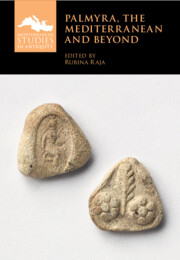Book contents
- Palmyra, the Mediterranean and Beyond
- Mediterranean Studies in Antiquity
- Palmyra, the Mediterranean and Beyond
- Copyright page
- Contents
- Figures
- Maps and Tables
- Contributors
- 1 Palmyra in the Mediterranean World
- 2 The Western Networks of Palmyra
- 3 You Can’t Get There from Here
- 4 Palmyrene Iconographic Traditions and Their Mediterranean Connections
- 5 Palmyra and Emesa or ‘Palmyre sans Émèse’
- 6 Organizing Networks to Supply Mediterranean Markets
- 7 Language, Law and Religion
- 8 Channels of Communication and Connections of Style
- 9 Identity and Mobility of Palmyrene Jews
- 10 Palmyrene Military Expatriation and Its Religious Transfer at Roman Dura-Europos, Dacia and Numidia
- Index
- References
9 - Identity and Mobility of Palmyrene Jews
Published online by Cambridge University Press: 21 October 2025
- Palmyra, the Mediterranean and Beyond
- Mediterranean Studies in Antiquity
- Palmyra, the Mediterranean and Beyond
- Copyright page
- Contents
- Figures
- Maps and Tables
- Contributors
- 1 Palmyra in the Mediterranean World
- 2 The Western Networks of Palmyra
- 3 You Can’t Get There from Here
- 4 Palmyrene Iconographic Traditions and Their Mediterranean Connections
- 5 Palmyra and Emesa or ‘Palmyre sans Émèse’
- 6 Organizing Networks to Supply Mediterranean Markets
- 7 Language, Law and Religion
- 8 Channels of Communication and Connections of Style
- 9 Identity and Mobility of Palmyrene Jews
- 10 Palmyrene Military Expatriation and Its Religious Transfer at Roman Dura-Europos, Dacia and Numidia
- Index
- References
Summary
Little is known about the Jewish presence Roman time Palmyra: the remains of a synagogue and other archaeological and epigraphic data indicate that Jews lived in Palmyra. Their presence is confirmed by onomastics. About twenty biblical names are preserved in inscriptions from Palmyra. Others are found in epitaphs from Beth She‘arim catacombs. However, Palmyrene Jews also bore Palmyrene names, and therefore it is not always easy to reconstruct identity and religious affiliation. Therefore the epigraphic data indicate only a small portion of what must have been the Jewish population of Palmyra. Examples of the mobility of Palmyrene Jews are illustrated by their presence in the Roman army, by first century BC–first century AD ossuaries from Palestine with Palmyrene epitaphs and by Palmyrene onomastics in Aramaic and Greek epitaphs. Westward mobility of Palmyrenes is displayed in an Aramaic Bar Kokhba letter mentioning an individual of Palmyrene origin. Finally, fourth to seventh centuries AD documents from Israel and Jordan written in Hebrew, Aramaic or Greek show the persistence and fortune, within Jewish and proto-Christian communities, of the name Zenobios and Zenobia, an onomastic choice inspired by the foremost protagonist of the last phase of Palmyrene history.
Keywords
Information
- Type
- Chapter
- Information
- Palmyra, the Mediterranean and Beyond , pp. 187 - 211Publisher: Cambridge University PressPrint publication year: 2025
References
Accessibility standard: WCAG 2.1 AA
Why this information is here
This section outlines the accessibility features of this content - including support for screen readers, full keyboard navigation and high-contrast display options. This may not be relevant for you.Accessibility Information
Content Navigation
Allows you to navigate directly to chapters, sections, or non‐text items through a linked table of contents, reducing the need for extensive scrolling.
Provides an interactive index, letting you go straight to where a term or subject appears in the text without manual searching.
Reading Order & Textual Equivalents
You will encounter all content (including footnotes, captions, etc.) in a clear, sequential flow, making it easier to follow with assistive tools like screen readers.
You get concise descriptions (for images, charts, or media clips), ensuring you do not miss crucial information when visual or audio elements are not accessible.
You get more than just short alt text: you have comprehensive text equivalents, transcripts, captions, or audio descriptions for substantial non‐text content, which is especially helpful for complex visuals or multimedia.
Visual Accessibility
You will still understand key ideas or prompts without relying solely on colour, which is especially helpful if you have colour vision deficiencies.
Structural and Technical Features
You gain clarity from ARIA (Accessible Rich Internet Applications) roles and attributes, as they help assistive technologies interpret how each part of the content functions.
